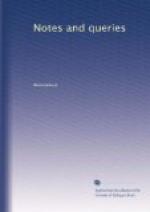[Greek: PH.]
Fool or a Physician (Vol. i., p. 137.; vol. ii., p. 315.).—The writer who has used this expression is Dr. Cheyne, and he probably altered it from the alliterative form, “a man is a fool or a physician at forty,” which I have frequently heard in various parts of England. Dr. Cheyne’s words are: “I think every man is a fool or a physician at thirty years of age, (that is to say), by that time he ought to know his own constitution, and unless he is determined to live an intemperate and irregular life, I think he may by diet and regimen prevent or cure any chronical disease; but as to acute disorders no one who is not well acquainted with medicine should trust to his own skill.”
Dr. Cheyne was a medical writer of the last century.
A. G——T.
Wat the Hare (Vol. ii., p. 315.).—In the interesting, though perhaps somewhat partial, account of the unsuccessful siege of Corfe Castle, during the civil wars of the seventeenth century, which is given in the Mercurius Rusticus, there is an anecdote which will give a reply to the Query of your correspondent K. The commander of the Parliamentarian forces was Sir Walter Erle; and it was a great joke with his opponents that the pass-word of “Old Wat” had been given (by himself I believe) on the night of his last assault on the castle. The chronicler informs us that “Old Wat” was the usual notice of a hare being found sitting; and the proverbial timidity of that animal suggested some odious comparisons with the defeated general.
I have not the book at hand, but I am pretty sure that the substance of my information is correct.
C.W. BINGHAM.
Bingham’s Melcombe, Blandford.
Law Courts at St. Albans (Vol. i., p. 366.).—Although unable to answer [Greek: S.], perhaps I may do him service by enabling him to put his Query more correctly. The disease which drove the lawyers from London in the 6th year of Elizabeth (1563) was not the sweating sickness (which has not returned since the reign of Edward VI.), but a plague brought into England by the late garrison of Havre de Grace. And it was at Hertford that Candlemas term was kept on the occasions. See Heylyn, Hist. Ref., ed. Eccl. Hist. Soc. ii. 401.
J.C.R.
The Troubles at Frankfort (Vol. i., p. 379.).—In Petheram’s edition of this work, it is shown that Whittingham, dean of Durham, was most likely the author. That Coverdale was not, appears from the circumstance that the writer had been a party in the “Troubles,” whereas Coverdale did not reside at Frankfort during any part of his exile.
J.C.R.
Standing during the Reading of the Gospel (Vol. ii., p. 246.).—
“Apostolica auctoritate mandamus, dum sancta Evangelia in Ecclesia recitantur, ut Sacerdotes, et caeteri omnes presentes, non sedentes, sed venerabiliter curvi, in conspectu Evangelii stantes Dominica verba intente audiant, et fideliter adorent.”—Anastasius, i., apud Grat. Decret. De Consecrat. Dist., ii. cap. 68.
J. BE. {350}




